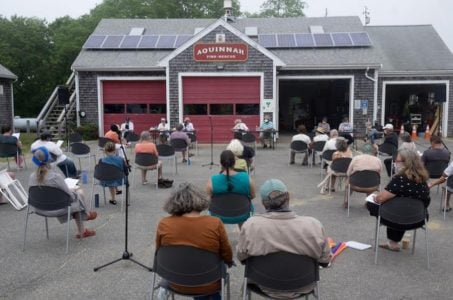Martha’s Vineyard Tribe Wants Stay on Judge’s Casino Ruling as Wampanoags Move Forward with Appeal
Posted on: July 13, 2019, 11:11h.
Last updated on: July 14, 2019, 03:03h.
The Wampanoag Tribe of Gay Head (Aquinnah) has asked for a temporary stay — and expedited review — on US District Judge F. Dennis Saylor’s recent ruling over a planned Martha’s Vineyard gaming venue. The request comes as the tribe appeals the requirement the bingo hall is subject to local Massachusetts permits.

Saylor said last month the tribe must comply with local and state permitting. However, the judge agreed the tribe can operate the casino on its sovereign property.
In a federal court filing on Thursday, the tribe’s attorney said the Wampanoags “will be irreparably harmed if the stay is denied.” The tribe needs gaming revenue “to provide essential governmental services to its members.”
The tribe also estimates it will receive between $3 million and $5 million a year from casino revenue. “Every day of delay is a delay in funding essential health services, education, housing, social services, cultural protection, police and fire protection, EMT services . . . and a multitude of other government services,” attorneys for the tribe claim in a court document.
Initially, Saylor in 2015 ruled against the tribe, saying it gave up sovereign rights when signing a settlement agreement in 1983. In 2017, the First Circuit Court of Appeals rejected much of Saylor’s ruling — and the U.S. Supreme Court in 2018 chose not to review the case.
Last month, the tribe requested the First Circuit review Saylor’s new ruling that the Wampanoags must get permits. The tribe contends it does not require local or state permits given rules found in the federal Indian Gaming Regulatory Act (IGRA).
With legal challenges pending, the towns of Aquinnah and Chilmark referred the project for review to the Martha’s Vineyard Commission (MVC). The commission is a regional planning agency that will consider such concerns as traffic or environmental impact.
Local Officials Allege Tribe Resumes Construction
If the tribe gets a stay, it can likely resume construction quickly. But during a Thursday MVC meeting, Aquinnah Selectman Juli Vanderhoop claimed the tribe has already resumed construction on the gaming venue.
As of yesterday [Wednesday], the town has seen movement on the property and is filing a contempt of court order,” Jeffrey Madison, Aquinnah town administrator, was quoted by the Vineyard Gazette. “It’s anathema to all of us who live in Aquinnah as to how there is to be a court order that is summarily ignored.”
Madison claims the town has photographs which show footings were installed for the bingo hall. Building on the project came to a halt earlier this year after town attorneys demanded the project be reviewed for local permits.
Incomplete Application Leads to MVC Opposition
Because the application on the project was incomplete, the MVC voted unanimously Thursday to deny the casino project. It can still be resubmitted with more details.
Land was cleared in February for the venue. Electricity to the site was cut in March because the tribe had not gotten an inspection from the town, but the tribe said it wanted to use its own inspector.
Last month, tribal Chairwoman Cheryl Andrews-Maltais told the Martha’s Vineyard Times, “They’re asking us to get permission, which we don’t need…. It’s simply disrespectful.”
They just want to keep their foot on our necks,” she additionally was quoted by the local newspaper.
Construction of the gambling hall is expected to take six months to complete. Plans call for a 10,000-square-foot venue that will feature 250 electronic games.
Casino.org reached out for additional statements on the casino dispute. But tribal and town officials declined to immediately comment on Friday.
Related News Articles
Most Popular
This Pizza & Wings Costs $653 at Allegiant VIP Box in Vegas!
Sphere Threat Prompts Dolan to End Oak View Agreement
Fairfax County Officials Say No NoVA Casino in Affluent Northern Virginia
Atlantic City Casinos Experience Haunting October as Gaming Win Falls 8.5%
Most Commented
-
VEGAS MYTHS RE-BUSTED: Casinos Pump in Extra Oxygen
— November 15, 2024 — 4 Comments -
VEGAS MYTHS RE-BUSTED: The Final Resting Place of Whiskey Pete
— October 25, 2024 — 3 Comments
















No comments yet